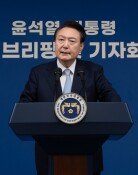Japan is Heading Back to the Militarism of 120 Years Ago
Japan is Heading Back to the Militarism of 120 Years Ago
Posted May. 25, 2005 03:36,
Professor Kojin Karatani (64, picture) of Kinki University is a star in the modern intellectual community in Japan. He started his career as a literature critic and expanded his range to history, construction and philosophy. Now, a person who transformed himself as a literature and art commentator and is also known as Haruki Murakami of the humanity studies community, he has been a great influence on young humanity scholars in Korea. His unique way of thinking in which he adds deep insight of modern and contemporary Western thoughts into the non-Western peripheral problem reorganization style is hailed in the West. We heard his views on the nationalism issues currently sweeping Korea, China, and Japan while visiting Korea University to give a lecture on the theme of East Asias Ideal at an academic conference celebrating the universitys 100th anniversary on May 24.
For the questions asking the differences between war-defeated Germany and Japan in its contrite attitude toward their past history, he approached the problem with an inquiry on whether these countries have maintained the ideal of expanding its community with neighboring nations. Germany has sustained and developed the dream of becoming the third country in the European Union after being defeated in the Second World War while Japan gave up its desire of forming the Grand Asia Community and pursued isolation from Asian countries, he analyzed. Against this backdrop, Germany has repeatedly made heartfelt apologies to neighboring countries for the ideal of a united Europe, but Japan, which chose westernization, is insensitive to the sense of guilt towards its neighboring nations.
He claimed that history repeats itself every 60 or 120 years while citing the famous phrases of Hegel and Russian economist Kondratiev about the Kondratiev wave -History repeats twice and Business cycles repeat every 50 to 60 years or 120 years.
Marx regarded the emergence of Napoleon during the French Revolution in 1789 and the presence of Louis Bonaparte in 1848 during a revolution as the repeat of history. The revolution in 1848 was replicated as another revolution in 1968, 120 years later.
On these grounds, the professor argued, Even though Japan is heading back to the past, it is backing up to the 1880s when Japan started to make a change to become a modern country, not to the 1930s when militarism emerged.
According to his analysis, in the 1880s, Yukichi Fukuzawas (1835-1901) theory of escaping Asia collided with the pan-Asia theory of Tenshin Okakura (1862-1913). In the end, the escape theory of Fukuzawa won, and Japan started to walk on the path toward the western imperialism.
Professor Karatani pointed out, Imperial Japan only recognized the chant of One Asia while ignoring the real meaning of Okakuras theory, and advocated the Grand East Asia Community, and it has clung to the idea of escaping Asia after losing in the Second World War.
However, Japans current desire of being separated from Asian countries comes from the lesson it learned from its defeat, and is distinguished from the original theory. In short, the idea reflects the thought that Japan should not conflict with the U.S. nor be on the same side with Asia.
I was very angry at Japanese politicians when they made absurd remarks that they should never mention if they really wanted to make close relations with Korea. Such behaviors make Japans numerous efforts to establish close ties with Korea useless. But I realized that Japan unwittingly repeats history 120 years ago while trying not to return back to 60 years ago after I witnessed the acts and remarks of Junichiro Koizumi and growing popularity among nation.
The professor emphasized that Asians should revive the cultural doctrine of One Asia, the part of Okakuras ideal, in order to avoid the same mistake of 120 years ago. He added that the ideal becomes hollow and ugly when the ideal is ignited by the country and money. Therefore, individuals in Asia should pursue the ideal through cooperation and coalition in order to make gradual progress while escaping the unnecessary repeated mistakes in history.
Chae-Hyun Kwon confetti@donga.com
Headline News
- Harris ‘first female president’ vs. Trump ‘again 2016’
- N. Korea builds 11-meter rampart after road demolition
- Democratic Party eventually agrees to abolish financial investment income tax
- Drug smuggling is seized twice a day on average this year
- Surrounded by ‘uniforms,’ NHL’s first female coach ‘time-out’







